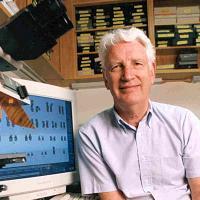
In 1960, at a time when scientists thought cancers came from viruses, Peter Nowell spotted a different cause: cells from patients with one type of leukemia had an altered chromosome. Nowell and graduate student David Hungerford noticed an abnormally small chromosome, soon named the Philadelphia chromosome, in cells from chronic myelogeneous leukemia (CML) patients. Not only did Nowell show that some cancers are caused by a genetic mutation, but that cancers arise because one cell with a chromosomal anomaly divides into many, as opposed to numerous cells simultaneously becoming cancerous. Other researchers built on his work to show just how the Philadelphia chromosome became altered—it is a hybrid of two other chromosomes that have moved and fused together. This, in turn, led to discovery of the gene that causes CML and ultimately, in 2002, to a commercially available medicine, Gleevec, which can block the effects of the gene and cure CML in 95% of patients.
Nowell received his B.A. in biochemistry from Wesleyan in 1948 and his M.D. from Penn 1952. He has been a faculty member and researcher there ever since, now a professor pathology in the School of Medicine.
One of his earliest discoveries, in 1956, was a boon to bone marrow transplantation, showing that irradiation allowed improved bone marrow transplants in mice, even if the marrow came from a different species. In 1960 he found that a plant protein called phytohemagglutinin (PHA) could be used to start up cell division.creating the world.s most frequently used technique for studying the human cell cycle and sparking decades of research on cell cycles and immunobiology. He also showed that gamma irradiation had a negative impact on liver cancer in mice, thereby drawing an important link between cancer and environment.
Nowell has won numerous awards including the Parke Davis Award in Experimental Pathology, the Philadelphia Pathological Society's Gerhardt Medal, the American Cancer Society (Philadelphia) Scientific Award, the Leukemia Society of America's Robert de Villiers Award, the Albert Lasker Award for Medical Research, the Memorial Sloan-Kettering Cancer Center.s Fred W. Stewart Award, and the Leukemia and Lymphoma Society of America (Eastern Pennsylvania Chapter) Lifetime Achievement Award.
Information as of April 2010

